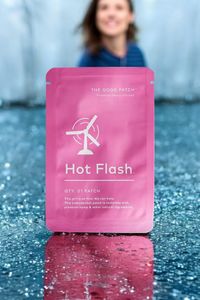Women's Experiences Using CBD for Menopause Symptoms
Women navigating menopause often face a range of symptoms—hot flashes, night sweats, mood swings, anxiety, sleep disturbances, and joint pain—that can disrupt daily life. With traditional treatments like hormone replacement therapy (HRT) not suitable for everyone due to side effects or personal preference, many have turned to CBD (cannabidiol) as a natural alternative.

Menopause Symptoms and CBD
Sleep Struggles and CBD
One of the most common menopause complaints is poor sleep, often triggered by night sweats or racing thoughts. Women frequently report that CBD helps them relax and fall asleep more easily. For example, a Harvard-led survey from 2022 found that 67% of midlife women using cannabis (which includes CBD) said it improved sleep disturbances. Anecdotally, some women describe taking CBD oil or gummies before bed, noting a calmer mind and fewer wake-ups. A woman in her 50s shared online that after weeks of insomnia, a low dose of CBD tincture gave her the first full night’s rest in months—without the grogginess of sleeping pills.
Mood and Anxiety Relief
Menopause can bring emotional turbulence, with anxiety and irritability spiking as estrogen levels drop. Many women say CBD helps take the edge off. In the same Harvard survey, 46% of respondents reported using cannabis for mood and anxiety, with most finding it effective. One user described feeling “less overwhelmed” after using CBD capsules during a stressful perimenopausal phase, while another said it dulled her anxiety without the fuzziness of prescription meds. These experiences align with CBD’s known calming properties, though women often emphasize starting with small doses to avoid feeling overly sedated.
Hot Flashes and Pain: Mixed Results
Hot flashes, a hallmark of menopause, seem trickier for CBD to tackle. Some women report no change, with one saying, “It didn’t touch my hot flashes, but it helped me care less about them.” Others notice a slight reduction in intensity, possibly tied to CBD’s anti-inflammatory effects or stress relief. Joint pain, however, gets more consistent praise. Women with menopause-related aches—especially in knees or shoulders—often turn to CBD creams or oils, describing a soothing effect that makes movement easier. A runner in her late 40s noted that topical CBD cut her post-exercise stiffness in half, letting her stay active.
Finally Relief
How Women Use It
CBD’s versatility shines in these stories. Oils and tinctures are popular for quick absorption—women drop them under the tongue for sleep or anxiety. Edibles like gummies offer longer-lasting effects, favored for all-day symptom management. Topicals target localized pain, with one woman swearing by a CBD balm for her arthritic hands. Dosing varies widely; some start with 10-20 mg daily, adjusting based on how they feel. A common thread is trial and error—finding the right product and amount takes patience.
Why They Choose CBD
For many, CBD feels like a safer bet than HRT or pharmaceuticals. Women appreciate its natural origins and lack of psychoactive “high” (unlike THC). A survey of over 250 peri- and postmenopausal women in 2022 showed 79% endorsed cannabis for symptom relief, with CBD often highlighted for its gentler profile. One user said, “I didn’t want hormones messing with my body more—CBD felt like a middle ground.” Others value its holistic appeal, easing multiple symptoms at once rather than targeting just one.
The Bigger Picture
While these experiences are compelling, they’re not hard proof. Research lags behind enthusiasm—most studies on CBD focus on chronic pain or anxiety in broader populations, not menopause specifically. A 2022 Rutgers study on estrogen-deficient mice showed CBD improved metabolism and inflammation, hinting at potential, but human trials are sparse. Women’s stories fill the gap, suggesting CBD’s worth exploring, even if it’s not a cure-all.
In short, women using CBD for menopause symptoms often report better sleep, calmer moods, and less pain, though results vary. It’s a personal journey—some swear by it, others shrug it off. If you’re curious, their advice is clear: start low, go slow, and pick a trusted product. It’s not a replacement for medical care, but for many, it’s a welcome tool in the menopause toolbox.
